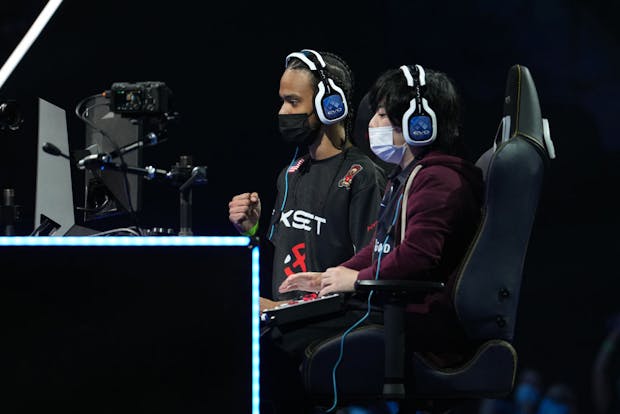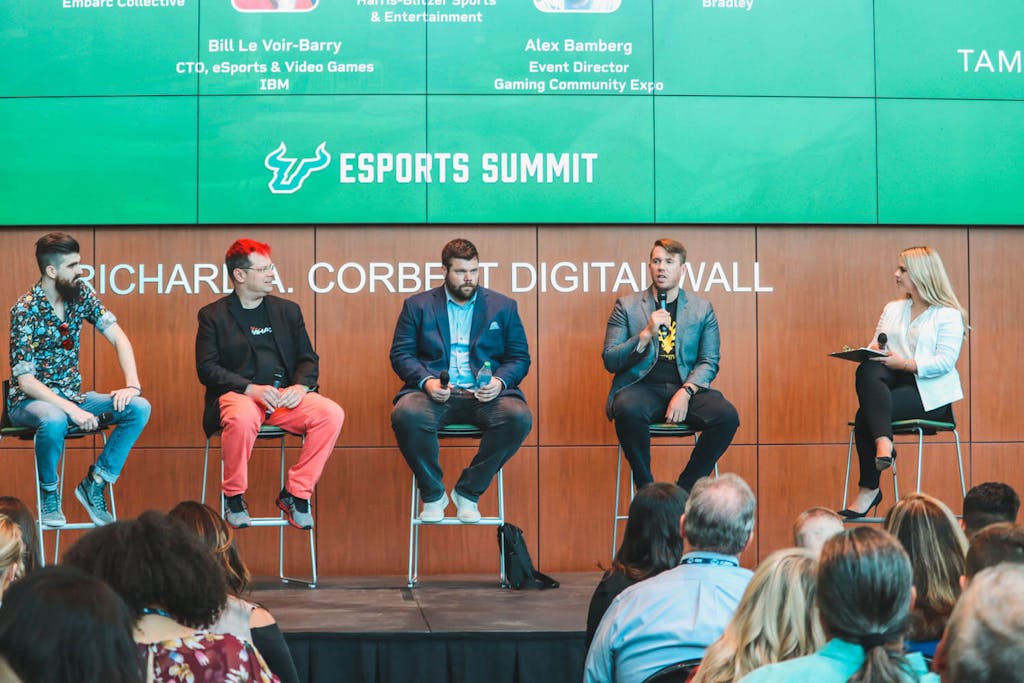
“There’s no truly comprehensive and up-to-date textbook and even if there was it’s going to be obsolete in five minutes.” These are the words of Jason Chung, who set up the Business of Esports course, offered as part of New York University’s (NYU) MS in Sports Business, before creating the world’s first fully online esports business Masters degree programme at the University of New Haven. He has now returned to NYU and taken on his current position as director of the university’s Esports and Gaming Initiative.
His thoughts speak to one of the several challenges and questions educational institutions are facing when it comes to teaching esports management – aligning teaching to trends in a highly dynamic and burgeoning space.
There’s no denying the eye-catching potential of esports. The latest research by SkyQuest Technology indicates that the global esports market was valued at $1.08bn (€1.08bn) in 2021 and is expected to reach a value of $2.8bn USD by 2028, at a compound annual growth rate of 14.5 per cent over the forecast period (2022-2028).
Around the globe, educational institutions are grappling with how to harness this potential juggernaut and provide meaningful options for students wishing to focus their studies on this space. Research published in September 2021 in the International Journal of Esports showed there to be 10 bespoke esports/esports management masters in operation at the time. Many more institutions offer modules or classes focused on the subject.
Chung is one of those involved in shaping the future of the approach at NYU. His view on how to ensure teaching is aligned to the most relevant trends in esports is centred on people and industry engagement.
Chung says: “Ensuring relevancy comes down to the people you have in the programme and the relationships you have. I’ve focused a lot of capital and time on bringing the right people in to teach and to bringing in real-world examples and consulting projects.
“It’s also about understanding the importance of not fetishising the subject matter, if an esports course has that business element then students still need to understand business principles, be able to present, work with clients and so on. So it’s about understanding and sourcing the right people who can focus on the most relevant topic areas and then having the confidence to execute on that education by leveraging existing resources and knowledge bases as well.”

Jason Chung, director, Esports and Gaming Initiative, New York University.
When crafting the Online Masters at the University of New Haven, Chung struck multiple partnerships with industry organisations to bolster the curriculum with real-world examples. He says: “I think any time you’re teaching applied business, having real-world and project-based learning is critical. Don’t just think that of this as an esports and gaming thing, it is a general higher education thing.
“In esports and gaming, experiential learning is even more critical, because what else will we teach? We are just starting to get publicly traded esports organisations, we are just starting to get financials, so if I’m going to create an esports finance class, what am I relying on? Where are the materials? So ultimately you do need that industry engagement, just to get the content that you need to teach in a meaningful way.”
Rick Burton, David B. Falk Professor of Sport Management at Syracuse University and the former Commissioner of Australia’s National Basketball League, arrives at the subject of esports education from a slightly different angle, as someone who has been involved in the traditional sports industry for decades. However, referring to the esports module he currently teaches, he agrees with Chung’s sentiments.
Burton says: “The biggest part is incorporating practitioners and organisations into the class and having them provide assignments that relate to their organisation’s current initiatives. I’ve worked with the likes of ESL and Copa90 for this purpose and therefore we rely less on me being a sole lecturer and look to involve industry professionals to ensure the class is at the cutting edge of the space.”
People supply presents challenge
While a strong industry network can be crucial for the success of esports education, there is a challenge in terms of the supply of academics suited to teach the subject at the higher education level. The demographics of the teaching base dictate that most experienced academics in the sports management space haven’t grown up with esports and gaming at the forefront of their experience and have instead more often been entrenched in the traditional sports industry via their education and professional experience.
There is also an issue around attracting people to teaching positions in the space. Chung says: “There are not a lot of people in general qualified to teach it and certainly not a lot of professionals who are willing take a pay cut to teach it depending on where a programme sits within an institution’s organisational structure. The question around attracting the right people to teach often comes secondary for a lot of places to the economic potential of establishing a programme. My advice would be that attracting the right people is the entire economic element. You can have great initial demographics and enrolment but if you don’t have the personnel and resources to exploit that or expand on that you’re barking up the wrong tree.”
With supply perhaps not meeting demand in terms of esports-focused academics, there is the question of how those more versed in traditional sports can excel in teaching the subject. For Burton, part of the answer to achieving this is found in increasing the involvement of students in the actual teaching process. He says: “Teaching esports has to be more Socratic than with traditional sports. I’ve found students that already had expertise in the area and were more informed than I was, so I’ve asked them to help teach and it’s exciting.”
“For a lot of faculty, that might be a scary concept. To give up the power and authority, but there’s an empowerment to it. If I have a student with prior knowledge teaching about League of Legends I can then put something about the subject on a test. All of sudden, the information imparted by the students’ peer was something I could test on and it helps my students pay that much more attention, whereas if I tried to talk about it off the cuff I just wouldn’t have that latent knowledge and therefore true authority on the subject.”
On the subject of traditional sport management professors teaching esports, Chung adds: “I think the key here is authenticity and honesty. That’s a tentpole of just all interaction with Gen Z audiences.
“Authenticity really matters here. If you go in saying, ‘I’m the cock of the walk and I know everything about esports after reading a textbook,’ they’re going to figure you out right away but if you go in and you say, ‘I don’t really watch esports for fun, but I understand and am researching the business fundamentals of the industry, how it interacts with other stakeholders, and I can teach you on that front,’ that is fine. If you also say, ‘I am exploring the space and I am doing it with you,’ that is also valuable.”
The second-highest ranked institution in Europe in the 2022 Postgraduate Rankings, masterSport is one of the organisations that has taken the step of launching a degree in eSports management at the Postgraduate level.
In response to interest from its industry partners, including some of Italy’s biggest football clubs, the Italian Football Federation and the Italian Olympic Committee, the masterSport staff began studying the esports space and launched its mastereSport, the first master’s degree in the esports market within Italy, in 2018. Like the original masterSport course, the degree was designed and built with the input of professionals and experts from the industry.
Mateo Masini, masterSport coordinator, said: “At the moment, specializing in a sector like esports management is a great opportunity because the esports sector is booming, especially in Italy, having started late compared to the UK and northern Europe, and has a continuous search for new professional figures. Studying the sector, getting to know the dynamics that animate it, getting to know the universe that revolves around the global phenomenon, getting into the details of the Italian system and being able to do it with constant confrontation with professionals makes the master Esports a unique experience on the national scene and offers the opportunity for enthusiasts to approach the job market with knowledge and tools.
“The response from the students was, and still is, incredible. Since its creation in 2018 we have already produced 5 editions and all have sold out thanks to partnerships with industry players who have given us their support in the implementation of the initiative and in the story of the project.”
Bespoke approach to gain popularity?
Although there are notable exceptions such as masterSport, it is noteworthy that despite the esports market already accelerating past the $1bn mark, there are still a limited number of degrees currently available for students at the postgraduate level.
Is this because more traditional sports management degrees that offer an esports module are satisfying student interest? And is this model sufficient in terms of preparing the next generation of esports commercial leaders to cope with the market’s predicted growth?
Chung said: “There’s no problem with sports management degrees offering components on esports and obviously no problem with the bespoke model; it really comes down to how the subject matter is treated. I think there are some places that will take a sport management degree, slap an e in front of it and recycle 90 per cent of the same courses to claim a new degree programme. That is not something I ascribe to, but there is a lot of overlap where it makes sense to have economies of scale, where it makes sense for students to learn about the wider sports industry. At the same time you must understand it is a different industry as well.
“You have to understand the culture, the market dynamics, the stakeholders within it and achieving that within the programme properly is the most important thing.”
Looking to the future, Burton and Chung agree that a greater volume of bespoke esports degrees is inevitable, with several institutions featured in the 2022 Postgraduate Rankings actively building a greater presence with regards to esports. NYU’s re-hiring of Chung is evidence of its interest in developing its offerings to the market, with this remit primarily focused on helping cultivate and develop the university’s strategy in regards to its offering in the esports space.
Meanwhile, global third-placed Vinik Sport and Entertainment Management programme has hosted an annual esports summit for the last three years at USF, with programme director Michele Harrolle writing about the approach of the programme to esports education in the 2021 Postgraduate Rankings.

Speakers at the 2019 USF Esports Summit
Chung summarised: “It’s inevitable we’ll see more and more bespoke esports degrees at the postgraduate level. Colleagues and friends within the industry have been charting this in North America, but also in the UK and globally. As responsible organisations, institutions will go where enrolment is and tuition dollars are.
“It’s key, though, to understand that it’s not a field of dreams situation, where if you build it they will come. You need to put money and weight behind it and a lot of unis are finding that out the hard way. The interest is there, we’re still early in the progression but we do anticipate massive growth, just as sport and entertainment programmes have been growing over the past years. But organisations have to understand where they are in the geographic market, mindset market and whether you are able to place students in industry and make connections. If you can’t do that, it’s hard to justify a programme.”
This article is part of the 2022 SportBusiness Postgraduate Rankings. To browse the entire report and view the overall tables, click here.